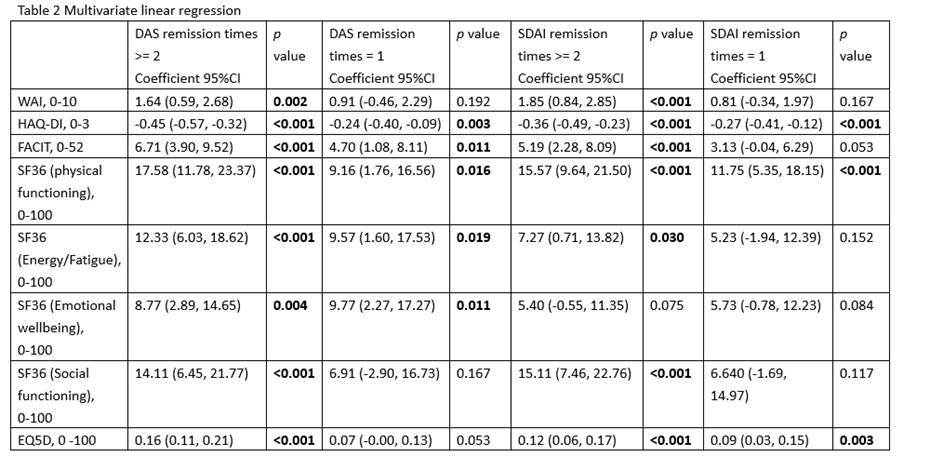Session Information
Session Type: ACR Poster Session C
Session Time: 9:00AM-11:00AM
Background/Purpose: RA patients often suffer from impaired work ability and reduced health related quality of life (HRQoL). Whether achieving remission through tight-control treatment strategy using conventional synthetic disease modifying anti-rheumatic drugs (csDMARDs) can improve work ability and HRQoL remains unclear. The aim of this study was to ascertain whether achieving remission can improve work ability and quality of life in early RA patients.
Methods: Early RA patients with symptom onset <2 years were recruited. All patients satisfied the 2010 ACR-EULAR classification criteria for RA (>=6 points). Remission status was measured by Disease Activity Score 28 (DAS28) and Simple Disease Activity Index (SDAI) every 3 months. Work ability was evaluated by working ability index (WAI) compared to life time best (score from 0-10, with 10 as best). HRQoL was assessed by 36-Item Short Form Survey (SF-36), Health Assessment Questionnaire Disability Index (HAQ-DI), Functional Assessment of Chronic Illness Therapy (FACIT) and EuroQol five dimensions questionnaire (EQ-5D).
Results: A total of 199 (51}13 years old, 158[79.4%] female, 146[73.4%] employed) patients completed one year follow up. At baseline, unemployed patients have a higher physician global assessment score, more swollen joints, lower WAI, lower EQ-5D and higher HAQ-DI (Table1). Using multivariate linear regression, achieving DAS28 and SDAI remission at ≥ 2 visits are independent predictors for better WAI, HRQoL, HAQ, FACIT and EQ5D at one year after adjustment for other covariates (Table2). Achieving remission only once in the first year was not associated with improvement in WAI.
Conclusion: Achieving at least two time remissions is important in improving patientsf work ability and HRQoL.
To cite this abstract in AMA style:
Lam HM, CHENG TH, Tam LS. Can Achieving Remission Improve Work Ability and Quality of Life in Early Rheumatoid Arthritis (RA) Patients? a Prospective Cohort Study [abstract]. Arthritis Rheumatol. 2017; 69 (suppl 10). https://acrabstracts.org/abstract/can-achieving-remission-improve-work-ability-and-quality-of-life-in-early-rheumatoid-arthritis-ra-patients-a-prospective-cohort-study/. Accessed .« Back to 2017 ACR/ARHP Annual Meeting
ACR Meeting Abstracts - https://acrabstracts.org/abstract/can-achieving-remission-improve-work-ability-and-quality-of-life-in-early-rheumatoid-arthritis-ra-patients-a-prospective-cohort-study/


